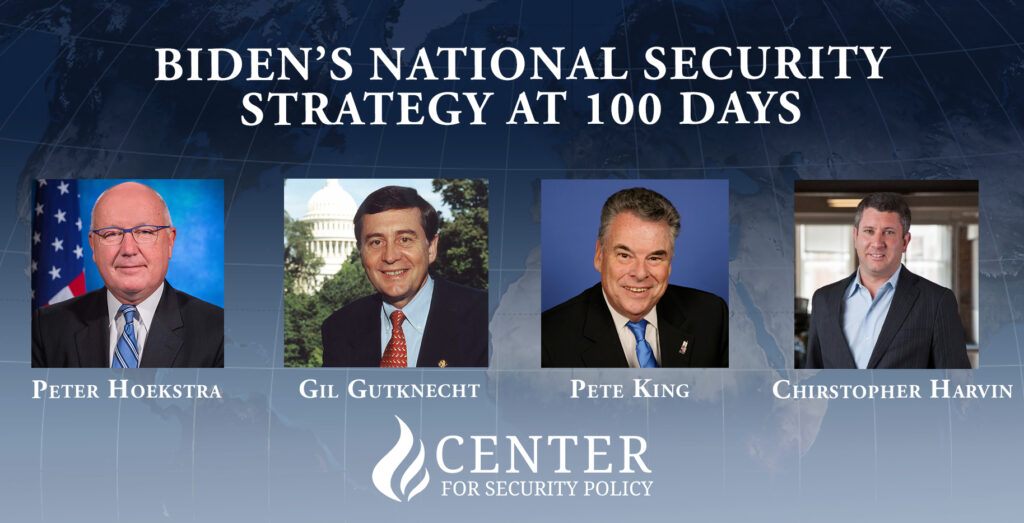Webinar: Biden’s national security strategy at 100 days
President Joe Biden addressed a scaled-down joint session of Congress to mark his first 100 days in office on Wednesday, April 28, 2021. The first address to Congress during a new president’s first year is historically not a State of the Union address, but an address to highlight the new president’s agenda.
To preview Biden’s speech, the Center convened a panel of former senior congressional leaders from its new Advisory Board to provide expert commentary and set expectations going into the speech. The session was moderated by Advisory Board Chairman Pete Hoekstra, former chairman of the House Intelligence Committee and U.S. Ambassador to the Netherlands.
WEBINAR: Biden’s National Security Strategy at 100 Days
Featuring Ambassador Pete Hoekstra, Gil Gutknecht, Pete King and Christopher Harvin.
He was joined for the session by former House Homeland Security Chairman Pete King, former Budget Committee member Gil Gutknecht, and former Pentagon senior adviser Chris Harvin. Hoekstra led the panel in a robust discussion focused on the crisis on the southern U.S. border, China, treatment of America’s allies in the Middle East, and attempts to force domestic social agendas into national security.
Chairman King emphasized the crisis at the southern border, noting it was born of the administration’s focus on policymaking by staking out positions opposite of former President Donald Trump. He highlighted how Biden opened the floodgates to the surge of migrants by arbitrarily ending Trump administration policies that were successful in staunching immigrant flows. He also pointed to Biden’s apparent desperation to reenter the Iran nuclear deal, his stiff-arm of Israel, and downplaying the successful Abraham Accords as putting Biden in the awkward position of trying to negotiate on behalf of the U.S. from a weakened position. While he thought Biden’s speech would primarily be focused domestically, he said he hoped Biden would use the address to reassure critical allies such as the Kingdom of Jordan, Israel, and other U.S. partners in the Middle East.
Congressman Gutknecht made the important point that Biden’s speech could be judged as much by what the president did not say as what he did. As he put it, “Listen to the dog that doesn’t bark.” He noted that the U.S. was outpacing Europe and the world on COVID vaccination, but he did not expect Biden to mention “Operation Warp Speed” because it was initiated by President Trump and led to development of a vaccine in record time. He also did not expect the president to talk about the border or a potential amnesty program because of the crisis the administration created. He also expressed concern about a possible loosening of tariffs on China and Hunter Biden’s business dealings with the country as a topic he did not expect to be addressed.
Former Pentagon adviser Chris Harvin explained the mechanics and staging for presidential addresses. He expected the President Biden to use speech to demonstrate he is control to a global audience as questions about the president’s age have lingered. He also noted the intentional timing of the speech—later in the year than previous presidents—so Biden could try to take credit for the vaccine rollout.
Hoekstra emphasized the administration’s attempt to frame climate change as a national security priority, pointing to an op-ed he wrote years ago that dubbed attempts at the time as “Bugs and Bunnies Intelligence.” Gutknecht raised the dangers of the Pentagon focusing more on social issues than warfighting while America’s enemies focused on how best to kill us. And King emphasized that China is watching the administration’s desperation to reenter the Iran deal and taking notes on how to win any future negotiations on a climate deal.
Following the discussion, the group answered questions from the audience that focused on the next 100 days, the administration’s response to Russia, and where Biden would focus his energy going forward.
- Frank Gaffney departs CSP after 36 years - September 27, 2024
- LIVE NOW – Weaponization of US Government Symposium - April 9, 2024
- CSP author of “Big Intel” is American Thought Leaders guest on Epoch TV - February 23, 2024

